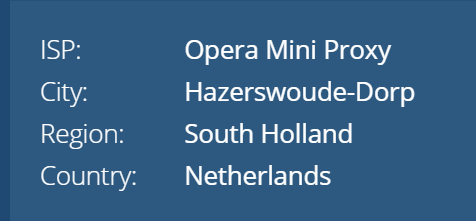Why does Opera VPN advertise itself as Proxy?
-
lavanyadeepak 0 last edited by
I was just experimenting the features of Opera VPN. It shows up as Proxy. Is it natural? A proxy and VPN in fact loads of differences between them.

-
lavanyadeepak 0 last edited by
@barbartleus I guess then Opera could consider enabling at least SSL traffic between the browser onto its gateway as a minimal encryption tunnel.
Slowly they work to provide a comprehensive end to end encryption. The browser shell itself could be helping as a desktop VPN client.
-
barbartleus last edited by
The key difference between VPN and Proxy is end-to-end encryption. All traffic passing through the VPN server is protected all the way from the entry point to the exit point. That's because when the VPN is turned on, an encrypted communication channel is created between your device and the VPN server, which protects all data from hacker attacks. Compared to a proxy, in the former case, we are handing an open suitcase of information to an intermediary who can either get ripped off or steal the data himself at any time. In the case of a VPN, we transmit data through a closed tunnel, which is extremely difficult to penetrate. But there is proxy for malaysia which combine the advantages of the two ways
-
donq last edited by
@barbartleus said in Why does Opera VPN advertise itself as Proxy?:
The key difference between VPN and Proxy is end-to-end encryption.
What do you mean with 'end-to-end'?
If you mean traffic between your browser and the destination server, then https protocol provides end-to-end encryption there, not VPN. VPN adds encryption layer for traffic between client (your browser) and VPN server, otherwise VPN server is just ordinary proxy. -
A Former User last edited by
I guess this browser is critical to browsing the web. If you can't connect, check to make sure the latest version is installed on your computer. If it is, then disable any extensions installed on your browser. To do this, go to the Opera icon in the top-left corner of the screen and hover over Extensions. Once you've done this, click OK.
-
hucker last edited by
@leocg said in Why does Opera VPN advertise itself as Proxy?:
@lavanyadeepak-0 Because it's basically a proxy.
So they lied? People are expecting privacy and don't get it.
-
hucker last edited by
@leocg said in Why does Opera VPN advertise itself as Proxy?:
@hucker A VPN is, basically, a (big) proxy
No, a proxy probably keeps records. A proxy probably doesn't encrypt. If you're in China or Russia and you want to look at news in another country, you'd better not just use a proxy, or you get jailed.
-
hucker last edited by
@leocg said in Why does Opera VPN advertise itself as Proxy?:
@hucker A proxy may not keep records as well a VPN can keep them, it's a matter of configuration.
Surely they're two different things? Or they'd have the same name.
I controlled a proxy at my work. It was used to block access to fun sites when staff should be working. But it kept records of everything, except when I deleted some to get someone let off

But VPN stands for PRIVATE network. I expect to be able to do anything I want without government agencies knocking on my door. Does Opera keep records? Do they encrypt to prevent interception? Things like Ivacy and NordVPN promise these.
-
blackbird71 last edited by blackbird71
@barbartleus First of all, a "true" VPN secures all traffic coming to/from a computer; a proxy works only on a single application (eg: web browser) level. A true VPN creates a fully encrypted tunnel from your computer to a targeted computer; if that target computer is a website's server, that website sees the IP of the VPN portal in its incoming traffic instead of your IP. An https proxy typically relies on the https encryption protocol for its level of encryption (an http proxy lacks even that); a website's server sees only the IP of the VPN portal in its incoming traffic instead of your IP. However, in either case, the target website may be able to discern user location information via Javascripted interrogation of the user's system. As well, in either case, a middleman who is monitoring national Internet traffic can still determine that a VPN or proxy is being used by an individual by noting the VPN/proxy portal IPs being contacted and comparing them to a list of known VPN/proxy IPs. A censor's ability to monitor the traffic content itself depends on the level of encryption involved (none, https, or beyond). Finally, in both the VPN and proxy cases, one must fully trust the service provider with regard to traffic snooping or contact record creation/retention.
While either a true VPN or an encryption-using proxy can hide the content of the traffic being viewed at a website, they cannot completely hide evidence of their being used per se. In some locales, the mere use of such devices to bypass censorship is considered illegal... so users must be aware of the local risks they may be running. A censor need only subscribe themselves to a VPN or proxy service to rather quickly determine the various portal IPs in use by the VPN/proxy, and either IP block or prosecute use of the VPN/proxy if they so desire. In the real world, larger and better-funded national censors tend to block more VPN and proxy IPs as well as certain proscribed target website IPs. The key point is that while either VPN or proxy might hide the particular content of what a user is specifically viewing, that they are using a VPN or proxy cannot be hidden from a censorship body.
-
leocg Moderator Volunteer last edited by
@hucker See https://help.opera.com/en/latest/features/#VPN
Also check https://www.opera.com/privacy to see what data Opera records.
-
hucker last edited by
@leocg said in Why does Opera VPN advertise itself as Proxy?:
@hucker See https://help.opera.com/en/latest/features/#VPN
Also check https://www.opera.com/privacy to see what data Opera records.
Sounds like a VPN not just a Proxy. And I forgot Opera was Norwegian, so no logging

However I assume this is only for within Opera, so I'll stick to NordVPN.
-
Locked by
 leocg
leocg